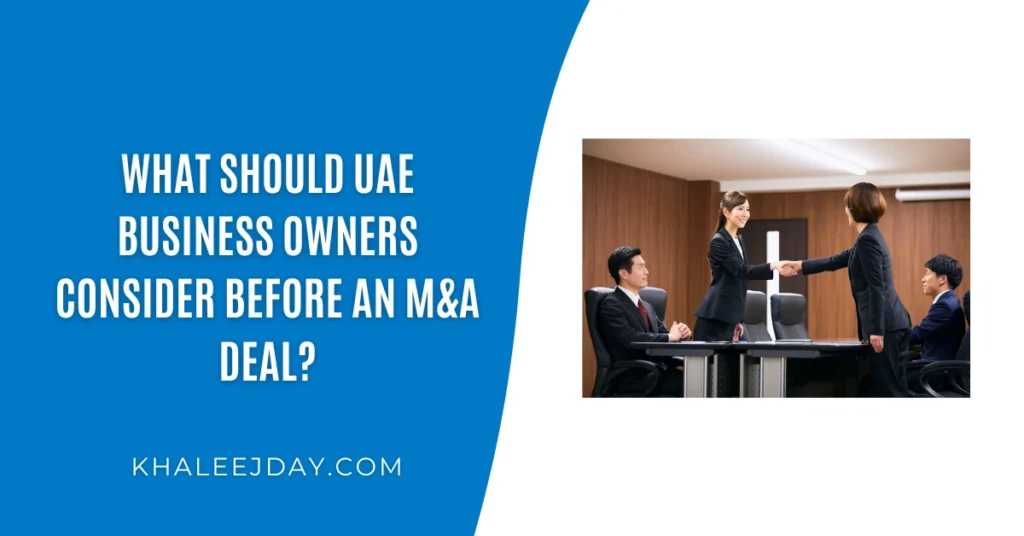What should UAE business owners consider before an M&A deal?
Mergers and acquisitions have become a common path for UAE businesses that aim to grow, restructure, or gain an edge in a competitive market. The country’s stable economy, investor-friendly laws, and strategic location make such deals attractive, yet they also involve complex decisions. Before entering an M&A deal, a business owner must understand the key factors that influence success and long-term value.

Each stage of the process demands careful thought—from reviewing financial and legal details to setting fair valuations and planning how the two companies will operate together. A well-prepared approach helps avoid costly mistakes and builds confidence among investors, partners, and employees.
Conduct thorough due diligence on financials and operations
Before an M&A deal, business owners in the UAE should carefully review the target company’s financial statements, cash flow, and debt levels. This step helps confirm that the numbers reflect the company’s true performance and that no hidden liabilities exist. Support from professional m&a advisory can help identify gaps or irregularities early in the process. Operational due diligence also matters. Buyers should assess supply chains, key contracts, and management efficiency. These factors reveal how well the business functions and whether it can meet future goals under new ownership.
In addition, owners should verify compliance with local laws, tax obligations, and licensing requirements. Any oversight in these areas could delay or reduce the value of a deal. A structured checklist and expert review help maintain accuracy and reduce risk before finalizing the transaction.
Evaluate regulatory compliance and recent legal changes
Business owners in the UAE must review current laws before entering a merger or acquisition. The country updated several regulations in 2025, including corporate governance, tax rules, and ownership structures. These updates aim to raise transparency and support fair competition across sectors.
Companies should confirm that both parties meet anti-money laundering and ultimate beneficial ownership requirements. Failure to comply can delay approvals or lead to penalties. Legal advisors can help verify that all filings, licenses, and disclosures match the latest government standards.
Foreign ownership rules now allow full control in select industries, which can affect deal structure and valuation. Buyers must study whether the target company qualifies under these new provisions. In addition, tax reforms and economic substance rules may influence post-merger reporting duties.
A review of compliance systems helps identify potential risks early. This step builds confidence among investors and regulators while reducing the chance of regulatory disputes after completion.
Assess valuation and potential synergies realistically
Business owners in the UAE should measure their company’s worth with methods suited to the local market. They can use common approaches such as discounted cash flow or comparable company analysis, but they must also factor in regional regulations, tax laws, and sector trends that may influence value.
A realistic valuation helps both buyer and seller set fair expectations. Overstating worth can delay negotiations or reduce investor trust, while undervaluing may cause losses. Therefore, accurate financial data and independent assessments add credibility to the process.
Synergies often motivate M&A deals, yet they should be viewed with caution. Cost savings, higher revenue, or operational efficiencies may appear attractive, but not all synergies materialize.
Owners should test assumptions carefully and confirm that projected benefits align with actual capabilities. A balanced view of valuation and synergy potential supports better decisions and reduces the chance of post-deal disappointment.
Negotiate buyer protection clauses like warranties and non-competes
Buyers often request warranties to confirm that the business information they receive is accurate. These clauses cover financial statements, ownership of assets, and legal compliance. Sellers should review each warranty carefully to avoid future disputes or claims after the deal closes.
A well-drafted warranty limits the seller’s liability and clarifies what risks transfer to the buyer. It also builds trust by showing transparency about the business’s condition. However, unclear or overly broad warranties can expose the seller to unnecessary risk.
Non-compete clauses protect the buyer from the seller starting a competing business soon after the sale. These clauses usually define a time period, geographic area, and type of restricted activity. Sellers should negotiate fair limits so they can still pursue other opportunities without violating the agreement.
Both sides benefit from reasonable terms that balance protection with fairness. Clear language and realistic boundaries help prevent future conflicts and support a smoother transaction.
Plan for post-merger integration and cultural alignment
A clear integration plan helps both companies operate as one team after the deal. Leaders should define how systems, processes, and reporting lines will connect. This step reduces confusion and helps employees understand their roles in the new structure.
Culture alignment also deserves early attention. Each company brings its own values and work habits, which may differ. Leaders should identify shared principles and agree on behaviors that reflect them.
Transparent communication builds trust across teams. Regular updates about progress and decisions help employees feel informed and respected. As a result, cooperation improves and resistance to change decreases.
Assessment tools or surveys can reveal cultural gaps before they cause problems. Managers can then address these areas through training, team sessions, or policy adjustments. Over time, consistent actions and clear leadership support a unified culture that sustains performance after the merger.
Conclusion
UAE business owners must weigh financial, legal, and operational factors before entering an M&A deal. Careful review of company value, debt, and future earnings helps avoid surprises after the transaction.
They should also confirm compliance with local laws and approval requirements to prevent delays or penalties. Expert advice from financial and legal professionals adds clarity and reduces risk.
A clear integration plan supports a smooth transition for staff and customers. Each step, from negotiation to execution, should align with long-term business goals and market conditions.





